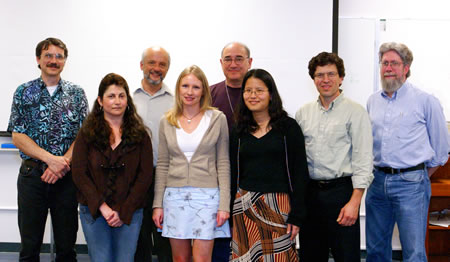|
|
|
|
|
 |
 |
|
|
|
R&D
100 nominees: front row, Silvia Crivelli, Julie Seeley,
Songi Han, Jonathan Slack, Tom Richardson; back row, Alex
Zettl, Deputy Director Pier Oddone,
Alex Pines |
|
|
Berkeley
Lab’s Technology Transfer Department has announced that
four research projects have been submitted for consideration
in the 2004 competition for R&D 100 Awards. Sponsored by
R&D magazine, the contest honors organizations and individuals
for the most technologically significant products introduced
into the marketplace.
A recent Lab reception honored the applicants and the proposal
preparation teams for their efforts. They included:
- Tom
Richardson and Jonathan Slack, Environmental
Energy Technologies Division, “Transition Metal Switchable
Mirrors.” This project features thin-film coating
on glass that can be reversibly converted to reflecting
or transparent mode through electrical charge or exposure
to dilute-hydrogen gas. They can be programmed to respond
to the amount of sunlight present. Chief writer for the
proposal was EETD’s Allan Chen.
-
Silvia Crivelli and Wes Bethel of the Computing
Science Division, for “Protein Shop”. This software
tool generates initial configurations for protein structures
in hours, enables the user to interact with the program,
and accelerates the construction of 3D candidates for inclusion
in the Global Optimization Program.
-
Alex Pines, post-doc Song-I Han and doctoral
candidate Juliette A. Seeley, Materials Sciences
Division, for “Remote NMR/MRI Detection of Laser-Polarized
Gases.” This process extends the capabilities of magnetic
resonance imaging by allowing the encoding and decoding
of the image signal to occur in two places, with instruments
optimized for each part. Laser-polarized Xenon gas is used
to carry and “remember” the coding. Jim Miller
was chief writer on the proposal.
-
Alex Zettl, of Materials Sciences, for “Synthetic
Rotational Nanomotor.” This nanomotor is the smallest
yet developed by three orders of magnitude and is based
on carbon sheets rolled into tubes, plus gold rotor blades.
The application could include a range of biosensors, cell
phones and other electronic equipment, and biomonitors.
Chief writer for the proposal was Julie McCullough.
Return
to Today at Berkeley Lab |

